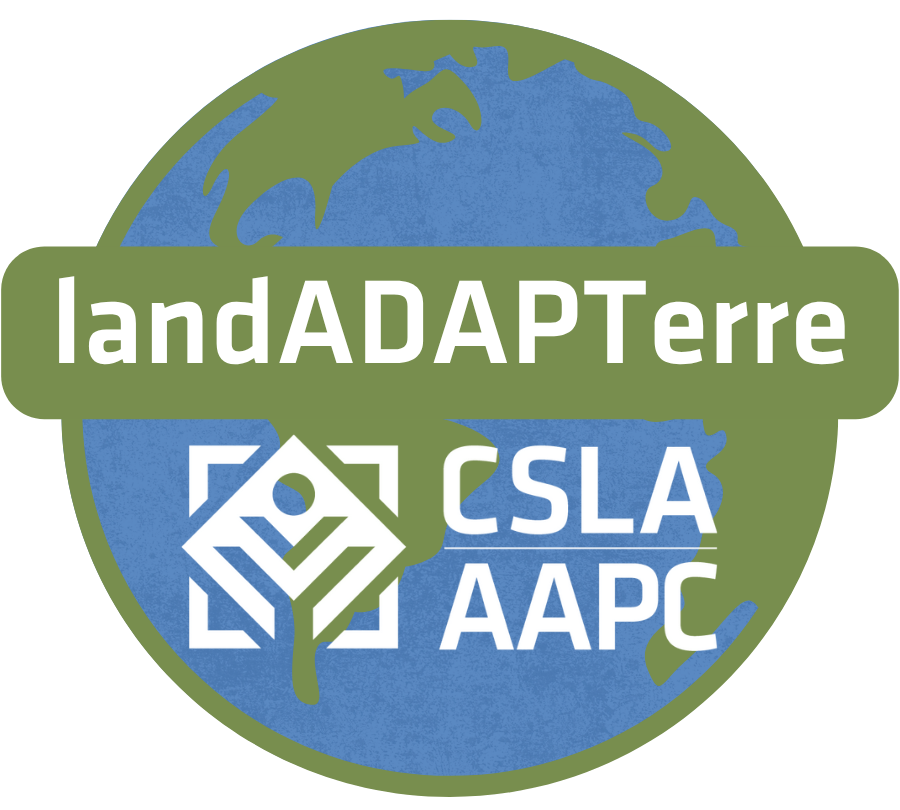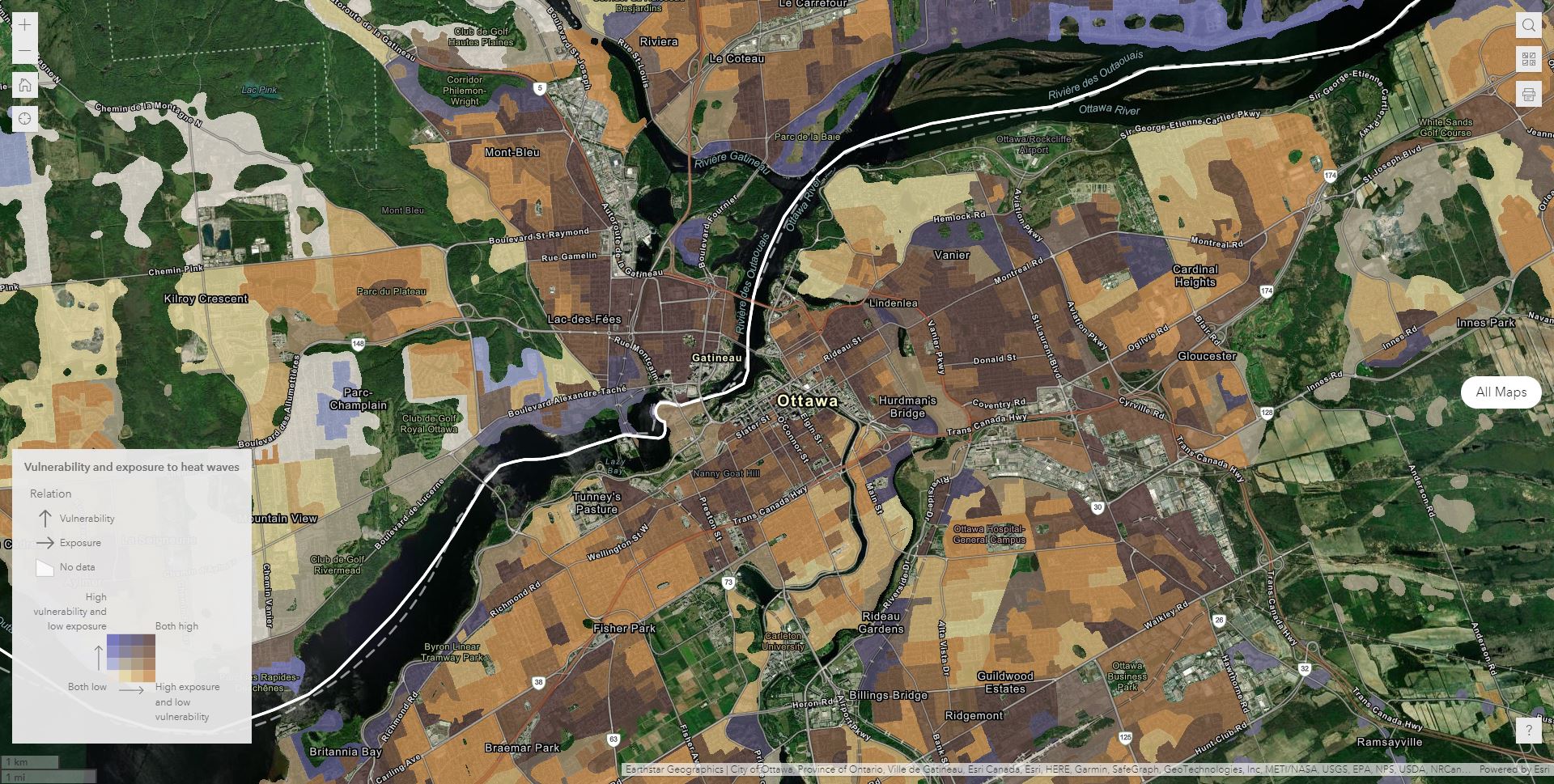
CSLA Responds to Canada's National Adaptation Strategy (NAS)
The CSLA acknowledges that Landscape Architects in Canada will play a significant role in contributing to climate adaptation across all five systems identified in the NAS, including: disaster resilience, health and well-being, nature and biodiversity, infrastructure, and economy and workers.
 landADAPT: Landscape Architects Navigating and Designing for Adaptation
landADAPT: Landscape Architects Navigating and Designing for Adaptation
landADAPT is a new continuing education program to promote building capacity through professional development opportunities for Canadian landscape architects, including:
- a monthly webinar series
- a series of climate change case studies, and
- a new online professional development course designed specifically for Canadian landscape architects.
landADAPT is supported by Natural Resources Canada’s Climate Change Adaptation Program.
Mapping the Vulnerability and Exposure to Extreme Heat Waves of Populations Living in Housing in Canadian Communities
 The Department of Geography of Université Laval has just launched a new online application dedicated to mapping the vulnerability and exposure to extreme heat waves of populations living in 156 urban areas across Canada. This application is free to use and available to industry professionals as well as the general public.
The Department of Geography of Université Laval has just launched a new online application dedicated to mapping the vulnerability and exposure to extreme heat waves of populations living in 156 urban areas across Canada. This application is free to use and available to industry professionals as well as the general public.
The tool allows for the identification of geographic areas that are vulnerable and/or exposed to heat waves, which will help specialists formulate more effective mitigation strategies, assist in decision making and establish procedures related to heat wave periods. Organizations can also take advantage of the application by downloading the geospatial data and integrating it into their GIS software.
FACT SHEET: Biden-Harris Administration Announces Roadmap for Nature-Based Solutions to Fight Climate Change, Strengthen Communities, and Support Local Economies
At COP27 in Egypt, the Biden-Harris Administration is releasing the Nature-Based Solutions Roadmap, an outline of strategic recommendations to put America on a path that will unlock the full potential of nature-based solutions to address climate change, nature loss, and inequity. This marks the first time the U.S. has developed a strategy to scale up nature-based solutions.
Jane Welsh, Chair of the Committee on Climate Adaptation, Addressing climate change through advocacy, policy and planning
 Three Toronto-based leaders representing a real estate company, a non-profit agency, and landscape architect Jane Welsh for the City of Toronto were invited for the final episode of the first season of SvN Speaks, to address the symbiotic relationship between municipalities, advocacy groups, and the real estate development community.
Three Toronto-based leaders representing a real estate company, a non-profit agency, and landscape architect Jane Welsh for the City of Toronto were invited for the final episode of the first season of SvN Speaks, to address the symbiotic relationship between municipalities, advocacy groups, and the real estate development community.
_Page_1.jpg) CSLA's Position Paper on Climate Adaptation
CSLA's Position Paper on Climate Adaptation
Resilient, Transformative and Sustainable: A Positive Approach to a Changing Future
Climate is changing, local weather patterns are becoming more extreme, and the collective actions of humans have had a significant influence on these changes. The CSLA believes that by working across environmental and cultural systems, landscape architects are uniquely positioned to engage professions, industries and governments in new alliances better equipped to innovatively address complex social and ecological problems and to fully express the opportunities inherent in principles of equity, sustainability, resiliency and democracy.
Read the CSLA's Position Paper on Climate Adaptation
 The Adaptation Primers
The Adaptation Primers
Introductory books that provide basic information on the most complex challenge facing decision-makers in this first half of the 21st century.
Read the Adaptation Primers to learn more about this global challenge.
Steps to Help Landscape Architects Plan and Design for the New Climate
Learn about the Nine steps to help you plan and design for the new climate
IFLA's Climate Actions
IFLA Climate Action Commitment
In September 2021, the CSLA Board of Directors endorsed the IFLA Climate Action Commitment which commits the profession to a series of strategies to limit planetary warming to 1.5 degrees C.
Learn more about the action commitment here
IFLA Declares a Climate and Biodiversity Emergency
September, 2019 - The International Federation of Landscape Architects (IFLA) has declared a Climate and Biodiversity Emergency at the IFLA World Congress in Oslo, Norway. The move comes following the unanimous support of the 77 voting nations and it maps out an action plan of what IFLA will do in response to the issues the globe is facing.
Canadian Landscape Architects Support the International Global Accord: Adaptation for a Changing World
Ottawa – November 29th, 2018– As of November 9th, 2018, the nine regional, provincial and territorial associations that comprise the Canadian Society of Landscape Architects (CSLA) have ratified the International Federation of Landscape Architects’ (IFLA) historic Global Accord on adaptation for a changing world. The Canadian was the first national association to ratify the Accord, and is also the first to have completed ratification by all its regional, provincial and territorial components.
CSLA Signs a Joint Statement on Advancing Integrated Climate Action
December 18th, 2018 - A joint statement was signed by the following national professional associations and endorsed by national municipal climate resources provider, ICLEI Canada, in support of advancing LCR in and across their respective fields:
- Canadian Society of Landscape Architects (CSLA)
- Canadian Institute of Planners (CIP)
- Royal Architectural Institute of Canada (RAIC)
- Canadian Water & Wastewater Association (CWWA)
Read the Press Release and Read the statement
The Committee on Climate Action and Biodiversity
Responsible for setting direction, representing the CSLA, managing workgroups and coordinating our engagement with government, and address climate justice.
Members: Catherine Berris (Co-Chair), Jeff Cutler (Co-Chair), Jane Welsh (Senior Advisor, landADAPT), Hope Parnham (Manager, Advocacy and Strategic Affairs), Katie Black, Andrea Kennedy, Caelan Griffiths, Todd Fell, Catherine Berris (Board Champion), Emily Bowerman, Tracey Hesse, Mélanie Glorieux

